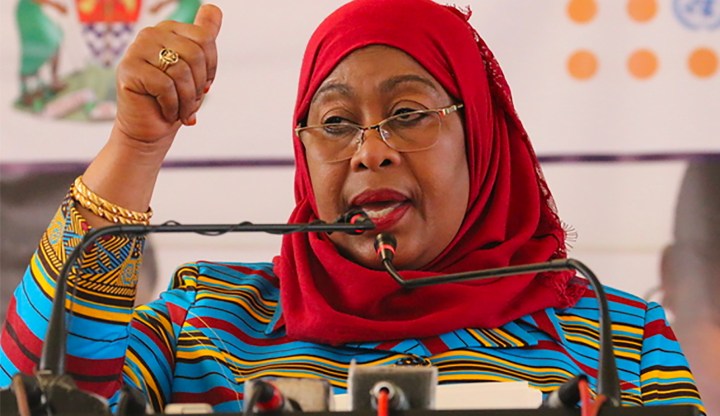ISS TODAY
Tanzania’s President Samia walking a razor’s edge over detention of opposition figures

The arrest of Tanzania’s main opposition party leader raises doubts about the new president’s commitment to democracy.
First published by ISS Today
Peter Fabricius, ISS Consultant.
The recent arrest of Freeman Mbowe, chairperson of Tanzania’s main opposition party Chadema, has raised serious questions about where new President Samia Suluhu Hassan intends to take her country.
Samia took over in March after president John Magufuli died of Covid-19. In his nearly six years in office, Magufuli dragged the country a long way down the road to authoritarianism by banning critical media and censoring coverage of sensitive government information.
He also took a high-handed approach to the pandemic, declaring that Tanzania had cured the disease by prayer, so no public health or other measures were necessary to fight it. Magufuli simply banned the publication of numbers of Covid-19 infections and deaths in May 2020 to the dismay of Tanzanians and the region.
Samia began lifting some of the media bans — but not all — and took a more scientific and rational approach to the pandemic, appointing a technical committee to examine it and starting a vaccination programme. Her general attitude towards public health has been “very positive” and a “far cry from Magufuli’s,” says Ringisai Chikohomero, a researcher at the Institute for Security Studies.
Nonetheless, it is revealing that Tanzania is still not reporting current Covid-19 data to the Africa Centres for Disease Control and Prevention, which publishes those figures for all African countries every week.
The consensus was that Samia’s tentative moves warranted cautious optimism. Then in July, Mbowe and 15 other Chadema members were detained — or “abducted at gunpoint” as one Chadema member put it — in a late-night police raid that disturbingly resembled the modus operandi of the Magufuli regime. State prosecutor Ester Martin said Mbowe had been charged with “economic sabotage,” “terrorism financing” and “terrorism conspiracy,” which didn’t allow for bail.
Tundu Lissu, who ran as Chadema’s candidate against Magufuli in last October’s presidential election, told Nigeria Television that the terror charges against Mbowe were “completely bogus and fabricated.” Lissu said he had merely been calling for constitutional and electoral reform “since the travesty of last year’s elections.”
The United States is treading more carefully than that. Under Secretary of State for Political Affairs, Victoria Nuland met Samia in Tanzania earlier this month and told journalists afterwards that she had been “quite frank about our concerns.”
Nuland added that “we were also very candid that when you arrest an opposition leader … the major opposition leader … it sends a chill through the environment. And President Samia has taken some very important steps to open the political space. She’s released a lot of political prisoners. She’s been far more accepting and open with regard to a free press. She did say she was eager to reach out and have a dialogue with the opposition.
“So our message … was simply to encourage her to stay that democratic course.” Regarding Mbowe, the US urged Samia to “ensure that there is an expeditious, just, transparent process for dealing with this case.”
So what’s happening with Samia? Was she ever on a “democratic course” in the first place, and if so, why did she stray from that path? Chikohomero believes that even if Samia is personally more enlightened than her predecessor, she is constrained by the ruling Chama Cha Mapinduzi (CCM), which remains much the same party.
“She inherited a system that remains intact. She has very little room to manoeuvre.” And if Samia had ambitions to run for office again in 2025, she would have to govern within CCM’s parameters to win its nomination as a presidential candidate.
Zitto Kabwe, who leads the second-largest opposition party ACT Wazalendo, said Mbowe had been arrested because “hardliners in the security forces and in CCM want to show the world that ‘During Magufuli = After Magufuli.”’
A Tanzanian politician who requested anonymity (which is telling in itself) said he believed Samia wanted democratic reforms. “But I believe she has no power base. So a good lady is being held hostage by regressive forces within the security establishment and CCM.”
Intriguingly, this analyst said some activists and opposition figures in Tanzania wanted to create the impression that nothing had changed since the Magufuli era. Mbowe’s arrest, therefore, played into the hands of extremists on both sides of the political spectrum.
Have some oppositionists invented — or exaggerated — the idea of a more enlightened Samia to pressure her to move in that direction? After all, there wasn’t much prior evidence of such enlightenment. Or is it just wishful thinking?
And is it possible that a Machiavellian CCM is playing into this by deliberately putting out mixed signals about where Samia is heading, precisely to confuse and divide the opposition? Some observers believe a similar tactic was used by the Zimbabwe African National Union — Patriotic Front (ZANU-PF) when it signalled that President Emmerson Mnangagwa intended taking Zimbabwe in a more liberal direction than Robert Mugabe had.
Nuland’s remarks suggest that the handling of Mbowe’s case will be a test of whether or not Samia returns to the democratic path she seemed to be taking. Others are taking a similar approach. Africa Confidential wrote that the trial “will be a key test of whether President Samia Suluhu Hassan’s regime is dropping the authoritarianism of her late predecessor John Magufuli and showing more respect for human rights.”
Chikohomero is more cynical, though perhaps more realistic. Speaking from his observation of how politics operates in southern Africa, he believes Mbowe will eventually be released “as they have no strong case against him. It’s just frustration and demoralisation.” Mbowe is due in court next week on 27 August, when the answers to some of these questions might emerge. DM
Peter Fabricius, ISS Consultant.


















 Become an Insider
Become an Insider
Comments - Please login in order to comment.